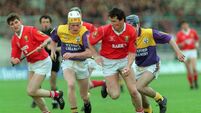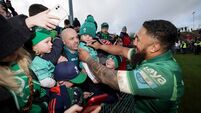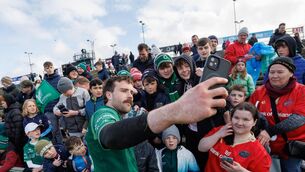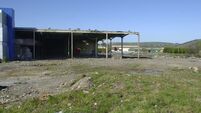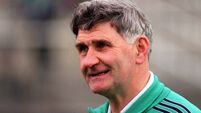Dion Fanning: Evan Ferguson and the enemy of promise

KEY GOAL: Evan Ferguson scored for Ireland against Bulgaria to end his goal drought.
A second can shape a story. When Evan Ferguson shot early and from distance in the 55th minute on Sunday night, the Lansdowne Road crowd appeared to come to an immediate and collective understanding of his thinking. He lacked confidence in himself, we concluded, so he had shot speculatively to keep the defender — and the doubt which is even more persistent — at bay.
A few minutes later, Ferguson again moved towards goal, played a one-two with the outstanding Finn Azaz, and produced a finish that changed the direction of the story.
As Ferguson turned away in joy, it was hard not to think of what that goal meant to him. He had finished with effortless calm, but as you watched him celebrate this moment — this finish that underlined his excellence and his promise — the goal acquired a greater significance.
Evan Ferguson began this season as a teenager but time is always an enemy in football. Sport functions on endless speculation about promise. We are always searching for the one who will change everything.
“Everyone in football,” Joseph O’Neill writes in his novel Godwin, ‘is secretly a scout. All are implicated in the search for the great player, the future vedette. It is a quest that excludes nobody — the discovery of the immortal one. About Eusebio it was said — by Jose Mourinho no less — that he would never die. The parent who does not inspect the child in the hope of seeing the trace of the eternal, that parent does not exist.”
In Irish football, we search endlessly for the eternal. If that isn’t on offer we want at least something to get us through the next international qualification campaign, which can often only seem like an eternity.
Ferguson is 20 now. It is over a year since we read of clubs preparing to make him a €150 million footballer. If there was something crass about the stories, if there was something crude in the commodification of this footballer, we put the discomfort to one side as we reasoned that this would mean he was establishing himself as a once-in-a-generation transformational Irish player. It was the least we deserved.
But when he scored on Sunday evening, it was more natural to think of the player than the significance for the country.
“I’ve had more bad than good in recent times,” he commented afterwards.
It was Ferguson’s third goal of the season — his second for Ireland — and that told the story of how things have developed for him at club level over the past 12 months.
At the age of 20, Ferguson’s promise seemed to be paused. More bad than good. One goal against Bulgaria won’t shape his career but it can be defined as good rather than bad. A game defined by the shot he took a few minutes beforehand might have allowed a different story to take shape.
There is an enormous weight on any player the Irish football public sense might be the next big thing — or even just a bigger thing. James McCarthy, James McClean, Aaron Connolly and Troy Parrott have all had to withstand some level of expectation that they were the figure who might make a huge difference.
The failure to live up to expectation does not temper the mood when the next candidate comes into view; if anything it makes the public more insistent.
Giovanni Trapattoni famously wondered who he was introducing into the game when he gave McClean his debut and, as one report put it, “answered the pleas of a nation”.
The nation wanted what it wanted. “Who is this? Messi? Maradona? Pele?” he asked as McClean came on a sub in 2012. McClean had a fine career for Ireland but he knows too the weight of that expectation, as do all the others.
Ferguson has had to carry that too. He has had to withstand the mania and the stupidity, the questions about declaring for England, the expectation that he could save Ireland.
In the absence of coherence and structure, it might be understandable that Ireland longs for a messiah. Little thought is given to what it means for the chosen candidate but those who feel they need salvation are not concerned by that.
Now Ireland looks forward again with a feeling that comes close to giddiness. The World Cup qualifiers arrive in September and while it would be a wild exaggeration to say Ireland fear nobody, let’s just say they don’t have to fear everyone.
This might be the best we can hope for in the long struggle back to respectability. The idea that Ireland would benefit from relegation to League C was predicated on the notion that Ireland would start winning matches if they moved down. But what if they didn’t? If we have learned anything from our recent past, it is that there isn’t an opponent Ireland can’t lose to.
Even these two games against mid-ranking League C stalwarts Bulgaria told us that nobody can confidently assert that Ireland will win a game.
In the end, Ireland were comfortable but there were those moments in both matches when it seemed calamity had returned.
That it didn’t owes much to the structure and organisation Heimir Hallgrimsson has brought to the Irish team.
Last September, Ireland were booed off after losing to Greece. It’s too early to look at this as a story of redemption, but Hallgrimsson is slowly, and without overpromising, restoring belief. Since arriving he has predominantly experienced one end of the mood swing that passes for the well-balanced psyche of the Irish football family.
Now Ireland get ready for the autumn with a host of new conversations. How does Heimir squeeze his players in? Can Troy Parrott — the player who looks essential under Hallgrimsson — and Ferguson play together? Where will Finn Azaz, Sammie Szmodics and Chiedozie Ogbene play in this squad of all the talents? Will Ireland be better off facing Portugal with or without Ronaldo? Would we like to be based on the east or west coast of America in the summer of 2026?
The caution that this was only Bulgaria will count for nothing as those games approach. Ireland may have an abundance of riches or else they might have to find a team from a reduced squad which is usually the way for Ireland managers.
It is to be hoped that not everything rests with Ferguson. He may get an opportunity to develop in a more understated way now, even if that goal also showed all he is capable of.
Even the chance he missed could be viewed differently after the goal. It was possible to see an element of opportunism in what he did. Did he notice that Plamen Iliev was leaving too much space to his right? If Ferguson had placed the ball six inches further to the left that would have been the second when potential was restored.
Instead that opportunity came minutes later. It was a moment that said so much about the player. It said so much about all he could be. But what that is remains a mystery. Like so much in the story of Evan Ferguson, imagining all he can be is sometimes just another enemy of promise.



